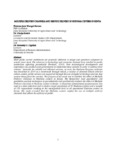MULTIPLE DELIVERY CHANNELS AND SERVICE DELIVERY IN HUDUMA CENTERS IN KENYA

View/
Date
2021-06Author
Kamau, Florence Jane Wangui
Rotich, Gladys
Ogollah, Kennedy O.
Metadata
Show full item recordAbstract
Most public service institutions are generally different in design and operation compared to several years back. The advances in technology and consumer demand have resulted to public institutions adjusting periodically (Banham, 2010). New technological development and innovations has pushed most governments to modernize their systems in order to address their citizens ' demands for reliable and efficient services. As such, the Huduma Program of Kenya was launched in 2013 as a framework through which, a variety of channels which advance citizen-centric public services are supported through the use of digital technology and one stop centres throughout the country. The purpose of the study was to establish the effect of Multiple Delivery Channels in Huduma centers in Kenya. The Researcher used quantitative and qualitative analysis techniques to quantitatively and qualitatively evaluate the effect of Multiple Delivery Channels in Huduma centers in Kenya. A researcher administered questionnaires was used as a data collection tool to study a target population of 51 Huduma Centres and a sample of 153 respondents working at the management level in all operational Huduma centres in Kenya. The study revealed that the Huduma centers employ the use of multiple delivery channels that affects the delivery of public Services they offer. The key purpose of this study is to establish the significance and core use of multiple delivery channels and how it affects service delivery in public institutions in relation to Huduma centres. The goal of the study therefore is to enable public institutions enhance adoption and application of multiple delivery channels in delivery of their services to the public to enhance efficiency and effectiveness.
